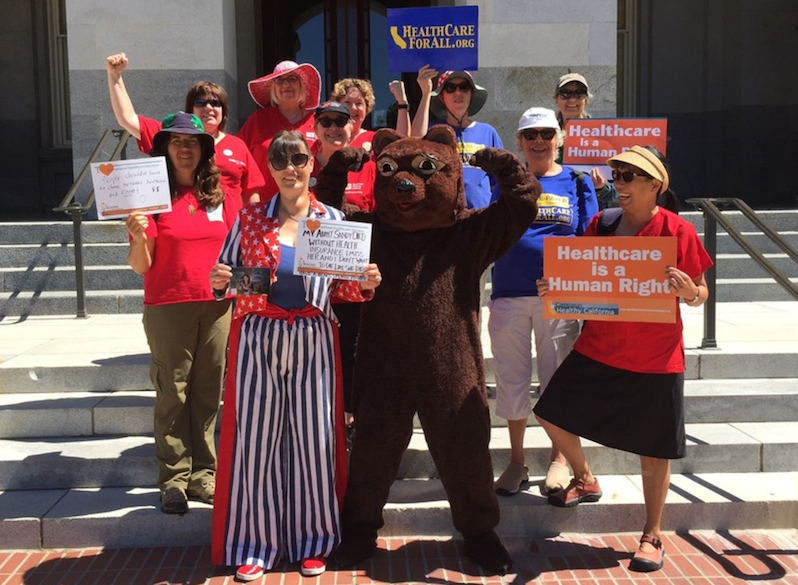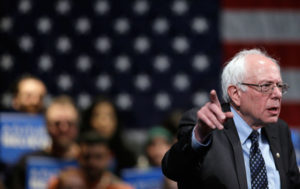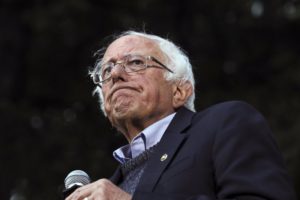Why California’s Single-Payer ‘Shell Bill’ Was Doomed From the Start
The Intercept explains how supporters of California's SB 562, recently shelved by Assembly Speaker Anthony Rendon, are "hiding the realities of California’s woeful political structure." Activists with the California Nurses Association showing support for California's SB 562. (California Nurses / Twitter)
Activists with the California Nurses Association showing support for California's SB 562. (California Nurses / Twitter)
Activists with the California Nurses Association showing support for California’s SB 562. (California Nurses / Twitter)
Update: Michael Lighty, the director of public policy at the California Nurses Association, has since responded to Dayen’s initial piece, arguing Dayen’s “cost estimate is exaggerated” and the “only Democrats Rendon is protecting are those funded by the health insurance companies.” Dayen then responded to Lighty’s statement — read both updates here. Dayen also quotes Dr. Paul Song, an outspoken critic of the current U.S. health-care system — listen to Truthdig Editor in Chief Robert Scheer’s interview with Song, conducted earlier this year, here. ***
All eyes are on California’s SB 562, a single-payer health care bill that has been advancing through the California Legislature in the past few months. When Assembly Speaker Anthony Rendon shelved the bill last week, advocates were outraged (including Vermont Sen. Bernie Sanders, who urged the Assembly to take up a vote).
But the bill’s passionate backers, including the California Nurses Association and Sanders’ “Our Revolution,” may not be sharing all of the facts with their supporters. In a new piece on The Intercept, author David Dayen argues that SB 562, like many California single-payer bills that have come before it, was doomed from the start.
Dayen writes:
The bill’s chief backers, including the California Nurses Association and the Bernie Sanders-affiliated Our Revolution, angrily point to Rendon as the main roadblock to truly universal health care.
They’re completely wrong. What’s more, they know they’re wrong. They’re perfectly aware that SB562 is a shell bill that cannot become law without a ballot measure approved by voters. Rather than committing to raising the millions of dollars that would be needed to overcome special interests and pass that initiative, they would, apparently, rather deceive their supporters, hiding the realities of California’s woeful political structure in favor of a morality play designed to advance careers and aggrandize power. …
There’s a reason that every California single-payer bill in the last 25 years — and there have been at least seven, two of which passed the legislature and were vetoed, so we in the Golden State have seen this movie before — never includes a funding mechanism. It’s not necessarily because of fear of voting for higher taxes, or even the two-thirds threshold to increase a tax in the legislature.
It’s because you can’t do the funding without help from the voters, because of California’s fatal addiction to its perverse form of direct democracy. The blame, in other words, lies with ourselves.
Dayen goes on to break down California’s “biggest constitutional hurdle,” Proposition 98.
“Passed in 1988, Prop 98 requires that roughly 40 percent of all general fund revenues — money the state receives in taxes — must go to K-12 education. If you include community college spending, it must exceed 50 percent,” Dayen writes. “As the Senate legislative analysis [of SB562] states, ‘Any taxes raised to support this bill would be … subject to the requirements of Proposition 98.’ That means that, in order to raise enough money to fund single payer in California, under current law you would have to raise twice as much to satisfy the Prop 98 formula.
“In order to fund single payer in California, you must loosen the Prop 98 budget straitjacket. … And the only way to truly get it done is with a ballot measure that either overhauls Prop 98 or exempts single payer from the formula,” Dayen continues. “The Senate version of SB562 stated it in black and white. But every single denunciation of Speaker Rendon’s decision to delay the bill fails to mention this reality, that SB562 cannot become law without voter approval.”
So why would advocates of the bill overlook this information when trying to garner support for it? Dayen argues that Sens. Ricardo Lara and Toni Atkins, co-sponsors of the bill, may have political motives. He writes:
Lara, incidentally — or more likely not incidentally — is running for Insurance Commissioner. Toni Atkins, a former Assembly Speaker, wants to become senate president when the current leader, Kevin de Leon, terms out next year. De Leon wants to run for … something; signs at the recent state Democratic Party convention read “Run Kevin Run” even though he hasn’t declared for any higher office. You don’t have to question their commitment to single payer to understand their motives to kick a shell bill without funding to the Assembly and bathe in the glory of the progressive faithful. Lara and Atkins claimed at one point SB562 would get a funding plan before becoming law, but they’ve continued to hide the reality of the necessary ballot measure.
As for outside groups, it’s clear that they have a strategy to make single payer a litmus test issue politically, while never acknowledging the process hurdles. With so many single-payer supporters in California and across the country unaware of the facts, playing this cat and mouse game is at best a sin of omission, at worst the kind of dishonesty that breeds cynicism in the public when it learns it was conned.
“Speaker Rendon is clearly taking the bullet for an Assembly Democratic caucus that is far more moderate than the Senate, and doesn’t want the burden of cleaning up the Senate’s shell bill,” Dayen concludes. “The entire debate is one big game of passing the buck, with single payer’s loudest champions earning plaudits from the liberal base but doing nothing to advance universal health care.”
Read the full piece here.
—Posted by Emma Niles
Your support matters…Independent journalism is under threat and overshadowed by heavily funded mainstream media.
You can help level the playing field. Become a member.
Your tax-deductible contribution keeps us digging beneath the headlines to give you thought-provoking, investigative reporting and analysis that unearths what's really happening- without compromise.
Give today to support our courageous, independent journalists.






You need to be a supporter to comment.
There are currently no responses to this article.
Be the first to respond.